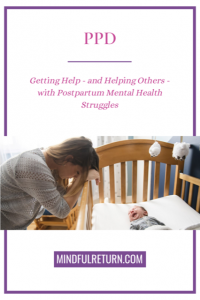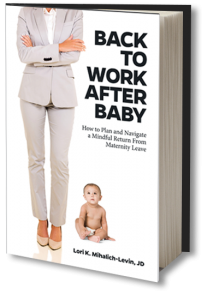 At Mindful Return, we are re-visiting this week the topic of parental mental health challenges, specifically postpartum depression or PPD. I have personally faced serious ups and downs in my own mental health – and that of my children – during the pandemic. I did not, however, become a parent during Covid. A few years ago on the Mindful Return blog, we shared the story of a Mindful Return alum who faced PPD and wanted to share her advice on navigating the return to work after baby in the face of that diagnosis. You can read her story here.
At Mindful Return, we are re-visiting this week the topic of parental mental health challenges, specifically postpartum depression or PPD. I have personally faced serious ups and downs in my own mental health – and that of my children – during the pandemic. I did not, however, become a parent during Covid. A few years ago on the Mindful Return blog, we shared the story of a Mindful Return alum who faced PPD and wanted to share her advice on navigating the return to work after baby in the face of that diagnosis. You can read her story here.
Today, I’m sharing with you the wisdom of another Mindful Return alum – this time, someone who became a mama during the pandemic. She is a brave PPD survivor who made it through to the other side. She is sharing her story (anonymously) here, in the hopes that if you – or someone you love – is struggling, you will have access to helpful resources and will feel less alone.
**********************************
Warning: suicide is discussed in this article. First, I provide information regarding Postpartum Depression (PPD) symptoms, considerations for short term disability and FLMA, safety nets to put in place before giving birth, and supporting a friend or coworker with PPD. At the end of the article, I share a personal experience and the hope after PPD.
First of all: if you are seriously considering harming yourself or others, please call 911 or go to a hospital. It is difficult to spend time away from family and friends. But being stable and having a treatment plan is vital. I write this article to provide advice from personal experience and am not a healthcare provider. In all things: trust your gut and communicate openly with your family and trusted friends / colleagues.
Symptoms of PPD
If you are wondering whether you have any of the symptoms of baby blues or PPD, please go to the Mayo Clinic’s page on PPD and review the list that is posted there. Taking an honest look at this list of symptoms during pregnancy may help you identify if something is “off”. You are the best judge of yourself and knowing when things just aren’t right. Depression during pregnancy can also be commonplace – especially given the additional isolating factors brought into play by COVID-19.
Having these symptoms doesn’t make you a worse mother or human being. And you are far from alone in experiencing them, if any on the list apply to you.
Work Logistics and Time-Off Toolkit
In the United States, workers have 12 weeks of time off under the Family and Medical Leave Act (FMLA) for giving birth and caring for themselves and their newborn. However, the FMLA does not apply in all circumstances. Before giving birth, learn about your company’s leave options and discuss them with your manager. Also, inform yourself about short-term disability (STD) options. Depending on your company’s policies, STD may be considered separately from FMLA coverage and also may be available if you need time beyond FMLA for additional health care. State laws may also come into effect here, so consult them.
If you find that you need additional care for PPD that results in being away from work for a period of time, consult your Ob/gyn or general practitioner to discuss paperwork related to FMLA and / or disability, whichever covers this. They will help you with forms for your employer and / or your employer’s disability insurance.
In terms of consulting your team at work, mention that you have complications from pregnancy and will need to take more time off. This can be a hard discussion, because chances are, you may feel disappointed in yourself. Or you may feel like this will go on forever. Know that if you are taking this time to heal, that is the right thing to do. You know yourself deeply, and taking additional time to heal serves you and your family. From there you can get back to work when you are ready.
Your Healthcare Toolkit
You are in touch with your Ob/gyn and any needed specialists before giving birth. Talk to them about PPD as early as possible and mention any depression or anxiety symptoms that you may be having. Laying that groundwork with them is essential. I write this from the perspective of the United States, where a six week postpartum visit is the norm. However, it’s important to note that the peak time for PPD symptoms is three to four months after birth, given the hormonal changes that occur then.
Know that having any preexisting conditions may increase your risk for PPD. Thyroid or endocrine system conditions, as well as pre-pregnancy depression and anxiety symptoms can all be risk factors. (Again, see the Mayo Clinic’s page for more information.)
You may not need this healthcare toolkit – but you can pass it on to a friend or colleague in need, and know that if PPD rears up for you that you have a plan:
- Seek out a therapist or psychologist who specializes in postpartum / perinatal depression. Regardless of whether or not you experience PPD, giving birth is a massive adjustment. A neutral 3rd party can be a great help here.
- Seek out a psychiatrist who is familiar with PPD.
- Look for PPD support groups in your area.
- Research mental health outpatient programs in your area, especially those that offer PPD support.
- Research mental health inpatient programs in your area.
How to Help a Friend or Colleague with PPD
As you navigate new mom life and connect with other moms, you may have a friend mention PPD symptoms or intrusive thoughts. Read the list of PPD symptoms, and then try to see you friend. COVID permitting, physical presence to discuss this is best. PPD symptoms and thoughts vary in intensity from person to person – our hormonal and chemical makeup informs a lot of it. There are also external factors like lack of support and isolation (especially with COVID – this one was the hardest for me).
As I said earlier, a desire to harm oneself or others has to be taken seriously. Physical presence again is big here, and may necessitate inpatient mental health care. Simply being there for your friend matters. Take her symptoms seriously, and let her know you are there for her no matter what.
A Personal Note
I am sharing the above, because my own experience taught me a lot about not ignoring PPD symptoms.
I would not wish this experience on another mother in this world. If you would be disturbed by reading about suicide, please stop here.
After giving birth during one of the peaks of COVID, I was adjusting to life as a working parent. This included: finding a daycare, negotiating hours with my managers, getting back into the swing of work with my team, and so on. My child was at a fantastic daycare and I was able to start working again. My company, credit to them, had a great leave policy.
I noticed that I was not sleeping well – beyond the times when my child would wake up at night. This lead to brain fog, fatigue, and overall malaise. I wasn’t feeling motivated to do things, and at the winter holiday season, I felt as though I was going through the motions. I pressed on with exercising as much as possible, meditating, and finding things to do with my child.
Because I felt there was not a solid way out of feeling like a completely different person, I overdosed one night and woke up in a hospital. After being transferred to an inpatient mental health care facility, I found stability and came home. With an intensive outpatient program, a therapist specializing in PPD and a helpful psychiatrist, I healed.
I’m writing this blog over a year later. My sleep is back to normal (as much as is possible with a child). My motivation and zest for life is back. And best of all, I am back.
There were times on that journey when it felt that the insomnia and fatigue would last forever. I am here to tell the world of working mothers that it is not forever. As one of the nurses I met during that time said, this was a speed bump, and it did not indicate that I would never be a good mother or good at my job.
Take care.
The National Suicide Prevention Lifeline is a hotline for individuals in crisis or for those looking to help someone else. To speak with a certified listener, call 1-800-273-8255.
Want more practical tips on working parenthood? Check out my book, Back to Work After Baby: How to Plan and Navigate a Mindful Return from Maternity Leave



